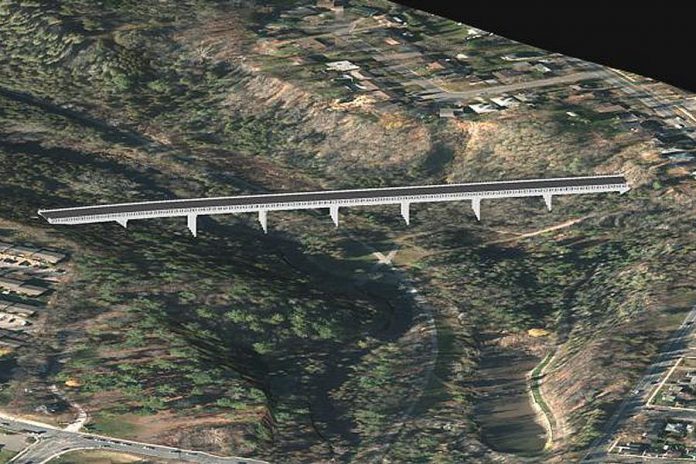
The City of Peterborough’s Parkway Corridor project, including the proposed bridge over Jackson Creek, may now be dead with last week’s decision by the Ontario Minister of Environment and Climate Change that the city must complete a full environmental assessment.
If not dead, the project — first conceived 70 years ago — is certainly on life support. Although the Minister’s decision doesn’t kill the Parkway per se, the requirement for the city to complete a full environmental assessment would require significant additional work, time, and expense — with no guarantee that project will be approved in the end.
“The environmental assessment will be subject to a government review, following which myself and Cabinet must decide whether or not to approve the proposed undertaking,” Minister Glen Murray writes in the letter announcing his decision.
Peterborough Mayor Daryl Bennett, who supports the project, was not pleased with the Minister’s decision to require a full environmental assessment (EA) and issued a written statement in response.
“The Liberal government wants Peterborough to spend another three or four years, plus another $2 million or more, on EA studies before it considers making a decision,” he wrote. “This is a sad day for progress in the City.”
On the other hand, local environmental groups applauded the decision.

“This decision represents a victory for the economic well being of Peterborough,” said Rob Steinman of Friends of Jackson Park. “The Parkway is the largest capital project the city has ever considered, and generated the greatest amount of public opposition to any city project in memory.”
“This could free up tens of millions of dollars to be spent on better transportation solutions that reflect the opportunities and the realities of the 21st century,” added Pete Hewitt, spokesperson for the Peterborough Greenspace Coalition. “We look forward to working with the city on a more thorough examination of transportation alternatives as required by the Minister.”
The City originally proposed the project as a “Schedule C” undertaking under the Municipal Engineers Association’s Municipal Class Environmental Assessment (known as a Class EA).
The Class EA process is a streamlined process for municipalities planning and implementing infrastructure projects, which avoids the onerous and time-consuming requirements of a full environmental assessment. Schedule C projects generally involve the construction or modification of facilities or significantly widening an existing road.
The city filed the Notice of Completion for the Parkway Corridor Municipal Class Environmental Assessment (EA) Study with the Ontario government on February 7, 2014. Since then, anti-Parkway groups have been lobbying the Minister to request a full environmental assessment of the project, given the most recent proposal to construct a four-lane bridge across Jackson Park.
In February 2016, the Minister requested further information from the City regarding the project before making a decision. According to the Minister’s letter at the time, the request was made in part because “significant time” — two years — had lapsed since the notice of completion and in part because the Minister had received 88 requests from various groups asking that the City of Peterborough be required to undertake a full environmental Assessment.
The City of Peterborough responded to the Minister’s request on May 2014, and, on September 16, 2016, the Minister issued his decision, determining that the project did not qualify as a Class EA. He issued a “Part II Order”, requiring a full environmental assessment.
“Of particular note in my consideration of this matter was the alternative to cross Jackson Park,” Minister Murray wrote in his decision letter. “The proposed Parkway Corridor may cause significant effects to the natural environment and impacts to noise, specifically with respect to the bridge proposed to cross Jackson Park.”
“The potential effects were not adequately considered,” he added. “The documentation provided to date by the City has not provided sufficient detail to ensure that potential impacts will be mitigated and the environment protected.”
In his decision, the Minister also requested additional studies to address any impacts to identified species at risk, as well as the significant natural features including the provincially significant wetland and the significant woodlands and valleyland sites. He also requested the city complete a new noise assessment for the living areas of the properties along the corridor and, given “significant public concern”, more evaluation of alternatives as well as additional public consultation.
Some of those who support the Parkway as a way to deal with ongoing traffic problems, particularly in the north end of the city, feel that alternatives to the Parkway corridor will be even more expensive and additional delay will stymie growth in the city.
“Part of that problem is the lack of a transportation network solution as we waited, along with the homebuilding industry, for almost two and a half years for a decision from the Liberal government on the Parkway Corridor Class Environmental Assessment,” Mayor Bennett writes in his statement objecting to the Minister’s decision.
“It has far reaching financial implications for this City, both in the short and the long term. The cost of doing remedial work on other basic traffic solutions will be plus or minus $30 million over and above the projected $80-million cost of the two-lane arterial street in the Parkway corridor.”
The Minister’s decision does not prevent the City of Peterborough from pursuing the Parkway corridor project, but it does require the city to spend a substantial amount of time and money to fulfill the requirement for a full environmental assessment — while at the same time having to come up with shorter-term solutions to deal with traffic congestion.
The Peterborough Greenspace Coalition believes that arterial road changes, traffic calming measures, traffic light synchronization, and computerized traffic management systems are some interim measures the City could implement at a fraction of the cost of the Parkway.
The coalition also believes that an effective public transit system and more fully developed cycling infrastructure could also improve transportation in the city.
A brief history of the Parkway
- 1947 – Parkway bypass first appears as part of the City’s Official Plan as part of a larger strategy to construct a ring road around the city to relieve traffic congestion.
- 1950s – City of Peterborough acquires land around proposed route and designates it for the Parkway Corridor, but does not move forward with construction.
- 1970 – Peterborough City Council officially abandons Parkway proposal.
- 2002 – City of Peterborough includes the Parkway again in its master transportation plan.
- 2003 – City of Peterborough holds a referendum on whether to proceed with the Parkway. Citizens reject the Parkway but the referendum fails to meet the required minimum turnout of 50% of eligible voters for a binding decision. City Council agrees to not carry out Parkway construction but leaves Parkway in the transportation master plan.
- 2011 – City of Peterborough completes transportation master plan that includes the Parkway; City Council approves the plan.
- 2013 – Consulting firm hired by City to complete class environmental assessment recommends a four-lane bridge be constructed across Jackson Park.
- 2014 – City of Peterborough files class environmental assessment for Parkway project.
- February 2016 – Province asks for more information from City about Parkway class environmental assessment.
- September 2016 – Province decides that full environmental assessment is required.

























